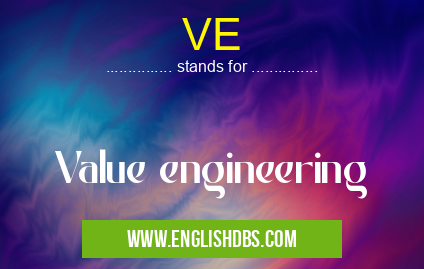What does VE mean in OCCUPATION & POSITIONS
Value engineering (VE) is a systematic and organized approach to improving the value of a product or service by identifying and eliminating unnecessary costs and complexities while maintaining or even enhancing its functionality. VE aims to deliver the same or better performance at a lower cost or improve performance at the same cost.

VE meaning in Occupation & Positions in Business
VE mostly used in an acronym Occupation & Positions in Category Business that means Value engineering
Shorthand: VE,
Full Form: Value engineering
For more information of "Value engineering", see the section below.
What does VE Stand for
VE stands for Value Engineering
VE means
VE is a methodology that involves analyzing the functions of a product or service, identifying areas where costs can be reduced without sacrificing quality or performance, and developing alternative solutions that meet the desired outcomes at a lower cost.
VE in BUSINESS
VE is widely used in various industries, including manufacturing, construction, healthcare, and software development, to improve product design, optimize processes, and reduce operating costs. By implementing VE principles, businesses can enhance their competitiveness, increase efficiency, and maximize the value they offer to their customers.
Essential Questions and Answers on Value engineering in "BUSINESS»POSITIONS"
What is value engineering (VE)?
Value engineering is a systematic and organized approach to identifying and eliminating unnecessary costs while maintaining or improving the function and quality of a product or service. It involves analyzing the product or service to determine its function, value, and cost, and then identifying opportunities to reduce costs without compromising performance.
What are the benefits of value engineering?
Value engineering can provide numerous benefits, including:
- Reduced costs and increased profits
- Improved product or service quality
- Enhanced customer satisfaction
- Increased innovation and creativity
- Reduced waste and environmental impact
Who can benefit from value engineering?
Value engineering can be beneficial for any organization or individual looking to reduce costs and improve the value of their products or services. It is particularly valuable in industries where there is a high degree of competition or where costs are a major concern.
How is value engineering implemented?
Value engineering is typically implemented through a structured process that involves:
- Identifying the problem or opportunity
- Gathering data and analyzing the product or service
- Generating creative solutions
- Evaluating and selecting the best solutions
- Implementing the solutions
What are some common value engineering techniques?
Common value engineering techniques include:
- Function analysis: Identifying the primary and secondary functions of a product or service and determining which functions are essential and which can be eliminated.
- Cost analysis: Identifying the costs associated with each function of the product or service and determining where costs can be reduced without compromising performance.
- Brainstorming: Generating a wide range of ideas for reducing costs and improving value.
- Value analysis: Comparing the value of different functions or components to their cost and identifying areas where value can be increased or cost can be reduced.
Final Words: VE is a powerful tool for organizations looking to improve their products, services, and processes while minimizing costs. By identifying and eliminating unnecessary expenses and complexities, VE helps businesses achieve better value without compromising quality or performance. It promotes innovation, optimization, and cost-effectiveness, ultimately contributing to increased profitability and customer satisfaction.
VE also stands for: |
|
| All stands for VE |
